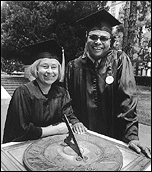![]()
![]()
![]()
![]()
![]()
![]()
Staffers Are
Among Berkeley's Throng of New Graduates
By Julia Sommer,
Public Affairs
Posted June 9, 1999
|
|
|
A trip to France and Italy in 1989 prompted staff member Carol Cannon to start college, at age 42.
"I went to so many incredible museums and churches," she recalls. "When I got home, I didn't want to go back to the same old life."
She enrolled at Contra Costa College in San Pablo, earning almost straight A's.
Then a friend suggested she apply to Cal. "I never thought I'd get in," says Cannon, "but I spoke with (student affairs officer) Angela Skrivanich, and she encouraged me to apply."
Cannon was accepted at Berkeley as a transfer student in 1996. She took three classes per semester, completing requirements for a BA in English in December with a 3.6 GPA.
On May 15 she took part in commencement ceremonies at the Greek Theater. Her guests included a long-lost brother who re-entered her life in 1995.
While a student, Cannon continued to work full-time as an AAIII for Joe Campione and the late Ann Brown, professors in the Graduate School of Education who study at-risk elementary school children. "They were very supportive," says Cannon of Brown and Campione. "I couldn't have done it without them."
Cannon used vacation and sick leave to attend classes and spent evenings and weekends studying. "It wasn't easy, but it was very satisfying," she says. "I was dogged -- I just kept on going."
Thinking about some classes brings tears to her eyes -- a poetry course taught by Robert Hass her first semester, a creative writing course with Maxine Hong Kingston, a junior seminar with Stephen Booth, a class on mother/daughter fiction with Elizabeth Abel, a senior seminar on American theatre with visiting professor John Wilkins.
"Sometimes I would think, 'It can't get any better than this,'" says Cannon. "When I retire, I'd like to audit classes. There are so many things I still want to learn."
Cannon started working at Berkeley in 1976 as assistant to Bill Carroll, director of Continuing Education of the Bar. Shortly after he retired in 1992, she took her present job.
With BA in hand, Cannon is taking time to travel (she recently spent three weeks in Italy), to visit friends she neglected while a student and to work in her Richmond garden.
Some day she'd like to work as a campus student affairs officer, helping others as Skrivanich helped her.
Gerald Johnson
"I didn't want to follow my brothers into Ivy League schools; I wanted to be different," says Gerry Johnson, who received his BA May 24 in ethnic studies.
After working in the telecommunications industry for many years, Johnson came to Berkeley in 1990 as an assistant in the Graduate Fellowship Office. There he was prompted by former Associate Dean of the Graduate Division Margarita Melville to apply to Berkeley.
Johnson went to Russ Ellis, former vice chancellor of undergraduate affairs, for advice, and Ellis also encouraged him to apply.
In spring 1995, at the age of 39, Johnson became a freshman at Berkeley. "I was real surprised to get in," he recalls.
Johnson moved to a half-time position as an assistant in molecular and cell biology and completed his degree in four years, taking advantage of Berkeley's two-thirds fee remission benefit for staff. He credits the campus re-entry program for helping him adjust to life as a "non-traditional" student.
"I knew I wanted to major in ethnic studies from the beginning," says Johnson. "I wanted to learn how to work with people from different cultures. This will be useful in business and education arenas."
As an older student, Johnson was able to become friends with his favorite faculty members, among them Robert Allen, Carlos Munoz, Pedro Noguera, Patricia Hilden and Jean Molesky. "Every course I've taken at Cal has been good," he says.
"You're as old as my father!" was a refrain Johnson often heard from younger classmates, and sometimes professors would ask him for ID. But Johnson says his age worked to everyone's benefit.
"Not having children of my own, I enjoyed learning about today's youth, and my life experiences were interesting to them," says Johnson. "When classmates and younger faculty talked about the '60's as history, I would say, 'Excuse me, I was there!' Younger students also asked me for advice, especially when they found out I was a mentor at Berkeley High School."
Johnson will take a year off from school before pursuing a masters in education. He would prefer to teach social studies at the junior high level, before students get too set in their ways.
Inspired by his work at the Graduate Fellowships Office, Johnson plans to apply for a Fulbright Fellowship to study the diaspora of people from the Cape Verde Islands.
![]()
![]()
June 9 - July 13,
1999 (Volume 27, Number 35)
Copyright 1999, The Regents of the University of
California.
Produced and maintained by the Office
of Public Affairs
at UC
Berkeley.
Comments? E-mail berkeleyan@pa.urel.berkeley.edu.
